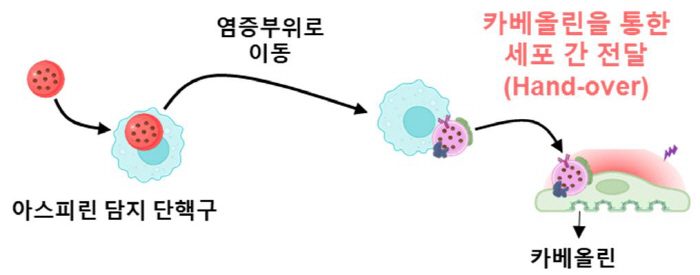Immune Cells Deliver Drugs to Target Cells Develop a New Platform...Expectation for precision treatment of cancer and cardiovascular disease
|
Professor Sung Hak-joon and Yoo Seung-eun of Yonsei University's medical engineering class, Dr. Kim Joo-eun, and instructor Jeong Se-yong of cardiology at Severance Hospital announced on the 26th that if aspirin is put on the immune cell monocytes and moved to the inflammatory area, the rate of delivering drugs to cells increases by up to 30 times.
The findings were published in the renowned journal 『Advanced Functional Materials』[IF 18.5)" in the field of materials.
Aspirin is a drug that simultaneously inhibits inflammation and platelet aggregation and is widely used for inflammatory and cardiovascular diseases. Since it is rapidly metabolized through the liver in the body, the action time is short and there is a limitation in that it is difficult to accurately target tissue or vascular lesions where inflammation is locally present.
To overcome the limitations of this drug delivery system, the research team has developed a new system that can deliver drugs between cells by burning them in a medium.
First, aspirin was loaded into small spherical nanoparticles and then injected into the mouse tail vein.
Injected aspirin and nanoparticles move to the spleen, which is responsible for immune function, where monocytes, an immune cell, absorb them. Monocytes move to the site of the lesion where the inflammatory signal occurs and transport aspirin mounted on the nanoparticles.
Monocytes then activate a handover mechanism that produces extracellular vesicles and delivers internal aspirin to surrounding inflammatory cells and platelets. Extracellular vesicles are objects that package intracellular substances and deliver them to neighboring cells. At this time, inflammatory cells express a protein called caveolin and receive aspirin. In this study, it was confirmed by video that the more severe the inflammation, the more this protein increases and acts as a key role in drug delivery between cells.
The research team verified the effectiveness of the development system on mice that induced inflammation in various tissues such as leg muscles, liver, and blood vessels.
The inhibitory effect of COX-2, an inflammatory indicator, improved by 90% as the drug was delivered 30 times more when aspirin was added in a handover method than when aspirin was added only. In addition, when aspirin was delivered to platelets via extracellular vesicles, a single intravenous injection lasted more than 7 days for antithrombotic effects. If aspirin was added, the lasting effect was only 2 hours and 30 minutes.
Professor Sung Hak-jun said, "This study is of great significance in identifying the mechanism of intercellular drug delivery that is activated according to the inflammatory response through imaging. It is a precision treatment platform that can spread the therapeutic effect to surrounding cells beyond simple target delivery. It can be widely applied to various diseases such as cancer and cardiovascular disease.".
|
This article was translated by Naver AI translator.





